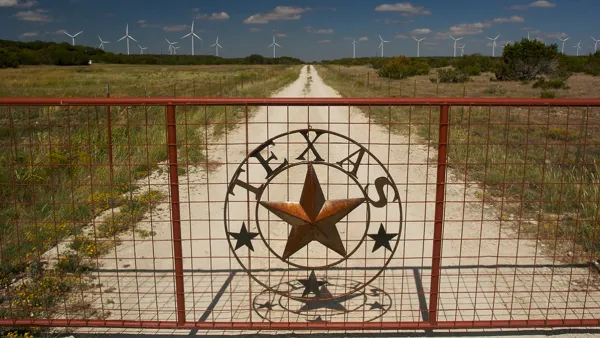Plummeting oil prices means Texans are seeing savings at the gas pump, but they also mean reduced revenue due to Proposition 1, the November 4 ballot measure that diverted energy taxes from the state's rainy day fund to the transportation budget.
Motorists in the United States are enjoying the lowest gas prices in five years, but as noted on Monday, a handful of major oil-producing states, including the nation's largest oil producer, are feeling the economic impact from those same low prices.
"Because [oil] production taxes are based on the cost of oil, falling values lead to falling tax revenues," writes Brandon Formby, transportation reporter for The Dallas Morning News. "That means the long-term transportation funding gap lawmakers were already facing in the 2015 legislative session could be bigger than previously thought."
The voter-approved infusion of cash [from Proposition 1] will be made toward the end of each year, so Texas Department of Transportation (TxDOT) won’t know for several months how much it will get from oil and gas production taxes in 2015. The landslide passage of the proposition in November garnered the agency an almost-immediate $1.6 billion deposit in 2014.
According to Aman Batheja of The Texas Tribune, the Texas Department of Transportation (TxDOT) budget shortfall stands at $5 billion.
But the amount Proposition 1 generates for highways will be a perpetually moving target, ebbing and flowing with oil and gas production and prices. Recent drops in oil prices have raised concerns that future payouts may be lower than originally expected.
Translation: Unless Gov.-elect Greg Abbott and the legislature can find the funds, the savings at the pump could be spent in increased repairs at auto body and service shops due to underfunded road infrastructure as we noted in October about roads in the Midland-Odessa region.
Abbott claims he will find the funds to fill the gap, wrote Batheja on Dec. 9.
I’ve outlined a detailed plan that will ensure that we add $4 billion more per year for building roads in this state without raising taxes, fees or tolls,” Abbott said at a press conference on (Dec. 8).
Legislators weren't so sure. State Rep. Joe Pickett, D-El Paso, who "sits on the Texas House transportation committee, says that shoring up transportation funding — without raising taxes or creating budget holes elsewhere — will be a challenge," writes Formby.
More than a dozen lawmakers have already filed bills that take aim at TxDOT’s shortfall during the legislative session that begins Jan. 13. A bill from Rep. Ruth Jones McClendon, D-San Antonio, calls for [a 10-cent] increase in the state tax on gas consumption. That tax, which is passed on to drivers at the pump, has remained at 20 cents per gallon since 1991. [It is the tenth lowest in U.S. per API, July 2014 (PDF)]
However, Pickett calls any bill that increases taxes "nonstarters." His solution? End what he calls spending "diversions":
That’s the term used for money taken from the state highway fund to cover operating expenses for agencies like the Department of Public Safety and the Department of Motor Vehicles. Officials estimate that more than $618 million that could go to TxDOT instead goes to other agencies each year.
Of course, that would mean diverting funds from the state's general fund to fill expenses previously paid by the highway fund if that bill succeeds. Rep. Jeff Leach's (R-Plano) bill calls for initiating tax diversions of the Proposition 1 type: "send some or all of the sales taxes on car purchases, vehicle rentals, automobile parts and tires straight to the highway fund." [Why not add bicycles sales as well? How about all sales taxes from services located adjacent to state highways?]
Texas legislators are certainly not alone in their reluctance to raise state gas taxes. We may be seeing more 'diversions'—of both kinds, to increase road spending in 2015.
FULL STORY: Falling oil prices could deepen Texas' road funding woes

Analysis: Cybertruck Fatality Rate Far Exceeds That of Ford Pinto
The Tesla Cybertruck was recalled seven times last year.

National Parks Layoffs Will Cause Communities to Lose Billions
Thousands of essential park workers were laid off this week, just before the busy spring break season.

Retro-silient?: America’s First “Eco-burb,” The Woodlands Turns 50
A master-planned community north of Houston offers lessons on green infrastructure and resilient design, but falls short of its founder’s lofty affordability and walkability goals.

Test News Post 1
This is a summary

Analysis: Cybertruck Fatality Rate Far Exceeds That of Ford Pinto
The Tesla Cybertruck was recalled seven times last year.

Test News Headline 46
Test for the image on the front page.
Urban Design for Planners 1: Software Tools
This six-course series explores essential urban design concepts using open source software and equips planners with the tools they need to participate fully in the urban design process.
Planning for Universal Design
Learn the tools for implementing Universal Design in planning regulations.
EMC Planning Group, Inc.
Planetizen
Planetizen
Mpact (formerly Rail~Volution)
Great Falls Development Authority, Inc.
HUDs Office of Policy Development and Research
NYU Wagner Graduate School of Public Service


























